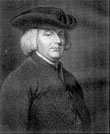Chapter 14. "The Teleological Argument" by William Paley

William Paley, Thoemmes
About the author…
Charles Darwin wrote that Paley's Natural Theology gave him as much pleasure as did his study of Euclid. William Paley (1743-1805) elaborates the main tenets of natural theology—the belief that the nature of God could be shown by an examination of the natural world. Although Hume devastated the teleological argument two decades before the publication of Natural Theology, Paley's argument continues to exert influence in nonphilosophical circles.
About the work…
William Paley in his Natural Theology; or Evidences of the Existence and Attributes of the Deity, Collected from the Appearances of Nature [1] argues for the existence of God based upon the intricate design of the universe. On Paley's view, just as the function and complexity of a watch implies a watch-maker so likewise the function and complexity of the universe implies the existence of a universe-maker.
Ideas of Interest from Natural Theology
What are the similarities between Paley's watch argument and Thomas's fifth way?
State Paley's argument for God's existence as clearly as possible.
How does Paley answer the objection that the universe could have come into order and pattern by chance?
To what extent is Paley's argument an ad hominem[2] attack on the skeptic?
Explain whether laws of nature are discovered or whether they are invented.